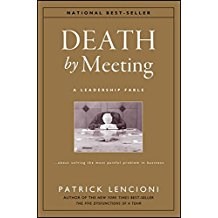
Death by Meeting
Patrick Lencioni
20014
Read: 2012
, by (2004)
I’ve always thought of myself is an excellent meeting manager. In fact, I’ve often joked that my ideal job would be a professional meeting runner. I believe in the theory of a well-planned agenda, an easy beginning and end, and a solid meaty middle part where difficult problems get resolved. But I’ve been in plenty of meetings that are pretty darned painful.
Like it or not, meetings are a big part of what I do. That’s how Lencioni begins. Lencioni pushes us that how sad it would be if professional baseball players said, I like my job except for the stupid games. As leaders, a big part of our job is planning, running and following up on the meetings. We often don’t do the work, we simply lead it, guide it, and make sure it happens like we want it to. If we don’t like the meetings where we discuss and lead those things, then we really don’t like the job we have.
- Conflict. Just like any good movie is based on conflict, a good meeting is based on it as well. People have to be willing to be honest, open and willing to voice opposition.
- Structure – Just like in TV you would not mix a movie, headline news, sitcoms and mini-series, maybe one meeting should not include all of those things.
- Daily “Headline News Meeting” – A Daily Check-In – A 5 minute meeting where the day is reviewed.
- Weekly 30 minute “Sit Com” meeting. Weekly staff meeting focusing on tactical issues – 30 – 90 minute with no pre-set agenda. Start with 60 second report from each person on the up to three projects the person is working on this week. Then, the team would review a scorecard of where we are relative to the company scorecard. From that point, the team would determine the content of the remainder of the meeting.
- Quarterly Offsite Meeting: Meetings should not be a chance to step away from day to day bothers, and look at the big picture and long-term impact stuff. One to two days. Best people, strategies, successes, failures, repositioning, maybe with an outside consultant, particularly on the offsites.
- Monthly strategic meeting. When you have topics that are about changes in strategy, new projects, and new goals, they should be saved until the monthly strategic meeting.
This book is a much needed book for any executive. We don’t think about our meetings enough. We don’t think strategically and we don’t plan the meetings. We can’t hate these meetings. Department meetings, Faculty Meetings, Principals’ Meetings and Cabinet Meetings. Not to mention, what typically are the least productive meetings of all, Board of Education meetings. All of them can be better. Plan it, give it meaning, conflict and context, and make them effective.
Leave A Comment